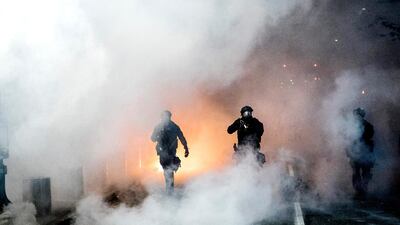Less than two months before the November 3 US presidential election, anxiety is growing that it could generate the worst American political and constitutional crisis in at least a century. The nightmare scenarios are so obvious, they have prompted a raft of reports, articles and even books about what could go horribly wrong.
One potential outcome, although at present seemingly the least likely, would be relatively smooth and uncontroversial. Although few think he can prevail in the popular vote, if incumbent President Donald Trump secures a clear electoral college victory then the outcome and transition will be relatively seamless.
For all the Republican talk about them being a "radical left-wing party", in fact the Democrats remain much as they have been in recent decades: a coalition between a powerful, centre-left majority and much smaller far-left factions. That the most centrist candidate on offer, veteran moderate Joe Biden, decisively won the Democratic primaries eviscerates the claim that the party has veered wildly to the left.
If Mr Trump emerges, when all the votes have been duly counted, as the victor in the electoral college, Democrats will almost certainly accept the result – as Hillary Clinton did in 2016, though she won the popular vote by almost 3 million. Republican Richard Nixon in 1960 and, even more dramatically, Democrat Al Gore in 2000, are also part of the noble bipartisan tradition of accepting questionable and unpalatable outcomes to defend the system’s credibility.
Republicans castigate Democrats as extremists, but there is no doubt which party has been captured by an extreme fringe, increasingly including QAnon conspiracy theorists.
Four years ago, Mr Trump refused to promise to accept the results, which he insisted would be “rigged", unless he won. When he did, all sides accepted it.
This year he has again refused to commit to accepting the outcome if he doesn’t win. To the contrary, he has been vehemently insisting, entirely without evidence or any factual basis, that if he loses it can only be the result of fraud.
He has been especially fixated on the supposed dangers of voting by mail, even though that has been common since the Second World War and it is his own usual personal practice. He groundlessly insists that it is bound to be the subject of enormous fraud.
But given that mail voting leaves a physical paper trail – as opposed to the alarmingly hackable electronic-only voting equipment in some states, while mail ballots might be more susceptible to fraud at a small and local level than some other methods – at a national level they will clearly be relatively secure and confirmable.
If Mr Biden wins a clear victory, whether broad or narrow, it has become increasingly difficult to imagine Mr Trump accepting that. In addition to the psychological and political factors, the presidency may be the only thing immunising him from a wide range of potential criminal charges. His incentive to stop at nothing to stay in office is enormous.
November 3 will be a very unusual – and dangerous – election night.
Americans typically expect to learn the winner before dawn. That is unlikely in this case, given the probable amount of mail voting because of the coronavirus pandemic. The concomitant potential for profound mischief and confusion is huge.
Surveys suggest that Democrats will be twice as likely to vote by mail as Republicans. And many states do not allow mailed votes to be tabulated before election day. So, it is likely that the President will appear to register an overwhelming, almost landslide, victory on the night of November 3, which could then completely collapse as mailed voting is counted in key swing states in the subsequent days.
One obvious nightmare scenario is that, if this happens, Mr Trump might declare victory and demand all mailed ballots be discounted and he be confirmed the winner, as he has done in several other recent elections involving his political allies.
Even if Mr Biden secures a strong victory, the timing of vote tabulations alone could produce chaos. And the profoundly litigious Mr Trump is almost certain to take everything to court, endlessly. If the results are close, contested, and still being litigated, it is even possible that, on January 20, 2021, two competing presidents, both claiming victory, could be sworn-in by different judges in alternate ceremonies.
It is no longer fanciful to imagine such a catastrophic scenario – or others involving the presidency being decided by the Supreme Court or the House of Representatives, both of which have happened before.
If Mr Biden's victory is clear early on, Mr Trump may be so isolated that he will be forced from office. But Republican leaders seem unconditionally committed to his political survival.
There is also a real potential for violence. Mr Trump has consistently promoted a vigilante culture. His rhetoric during the unrest in some US cities this summer felt like a test run for violent rage if he is defeated. Many Americans are bracing for tumult. The prospect of an American “colour revolution", perhaps also previewed this summer, to enforce the election results, is no longer absurd.
The political system itself appears antiquated and dysfunctional. While it was designed for institutional balance, partisanship has become paramount, as Mr Trump's impeachment proceedings, with no witnesses and a predetermined acquittal, demonstrated.
Structures created for a very different time no longer function as intended, if at all. The electoral college and the Senate are now mainly tools of a protracted, but unsustainable, minority rule. In the House and at the state level, partisan gerrymandering makes a mockery of democracy. The once rarely used Senate filibuster has become a standard tool of gridlock and veto by empowered minorities.
Worse, the Trump era has demonstrated how few meaningful non-partisan institutional checks thwart a brazen and rapacious President.
The test coming in November will be decisive for American democracy. Even if the country passes it, there will be an enormous task not only repairing the damage, but in correcting the fatal flaws in the US political system that have been so terrifyingly exposed.
Hussein Ibish is a senior resident scholar at the Arab Gulf States Institute and a US affairs columnist for The National

































